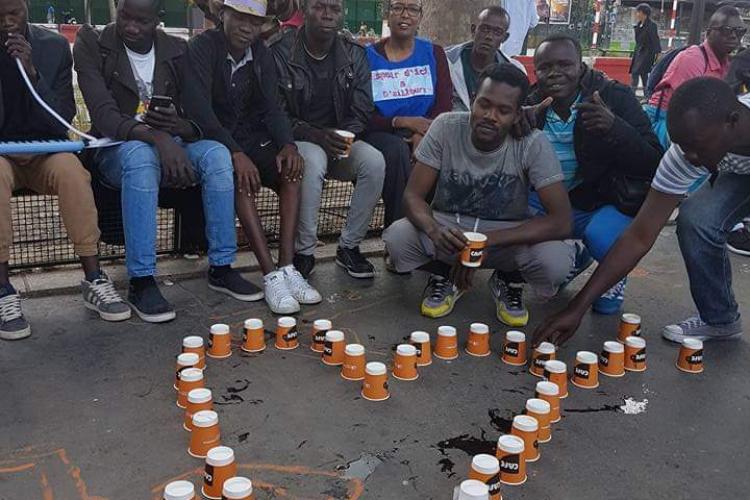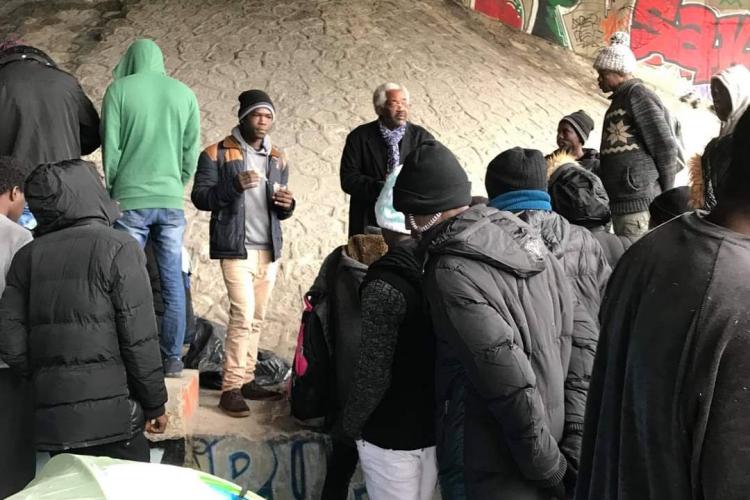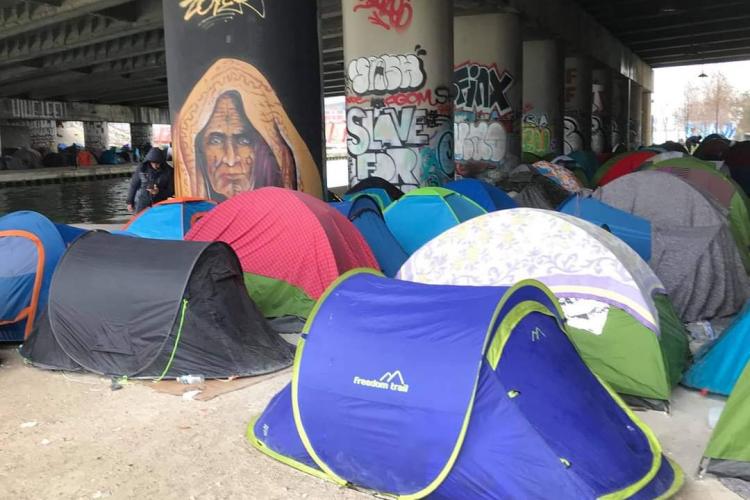Psychological Disorder, Stress and Suicidal Tendency Among Sudanese Refugees in France
Posted:
Time to read:
Guest post by Gaffar Mohammud Saeneen. Gaffar currently works as a social education assistant with the solidarity association Emmaüs, since 2017 and on permanent basis. In this role, he receives newly arrived asylum seekers, registers initial data, provides basic necessities such food, clothes, and shelter, whilst also taking care of orientation, referrals and interpretation. Prior to joining Emmaüs, Gaffar worked as a volunteer with several French associations working within the field of migration. He has moreover contributed to co-founding two associations: United Migrants and Espoir d'ici et d'ailleurs. This is the second post in Border Criminologies themed series on'Everyday Violence and Resistance in Europe’s ‘Migration Management’ During the Covid-19 Pandemic', organised by Marta Welander and Dr Susanne Jaspars.

This blog tells my personal perspective of the situation facing Sudanese asylum seekers and refugees (I will use the term refugees for both from now on) in France. It stems from a long experience on the ground, first as an asylum seeker, then refugee, and now as a French refugee support worker. I will try to shed light on issues of mental illness and suicidal tendencies amongst Sudanese refugees.
Those who follow the activities of Sudanese refugees via social media will notice the frequent news of psychological and social problems that they suffer in Europe, especially in France. Soon after arrival, these are some of the biggest problems faced by young Sudanese who buried the innocence of their adolescence between the hot Sahara and scary Mediterranean for a future afar away. Many Sudanese refugees in France today suffer from severe depression caused by a sense of alienation, self-isolation, feelings of regret, and many negative feelings, which may lead to addiction to alcohol, drugs and contemplating in suicide. You could say this is because of their lack of defence mechanisms, although if they had received reasonable sanctuary and sufficient psychological support this could be avoided. One Sudanese youth in Paris said: ‘there are more crazy Sudanese in Paris than the madmen in the popular market in Omdurman’. Here, the young man was expressing concern about the mental health of refugees in Paris, comparing it to a place back home.
Although there have been many studies on asylum and migration in France, few of them tell the human stories from an inside perspective, with the human being as an essential and pivotal element. The view must shift from concern with the objective dimension (social, political, economic) to the subjective dimension (human) and the dialectical relationship between them. Many researchers lack personal experience and this means that studies risk missing out on key aspects of migration.
The problems of Sudanese refugees are complex and require serious field study. I use this blog to describe and analyse the situation of the Sudanese who arrived in France between 2010 and 2020. It is based on my experience from 2014 onwards, through my volunteering with several French civil society associations and my work with Emmaus solidarity since 2017, which supports new arrivals with shelter and administrative procedures. Through discussions with members of the Sudanese community and observations of the daily life of refugees, I hope to open the way for others to delve deeper into the subject.

The impact of language barriers
Language has an extremely important role in human life, in communicating and expressing feelings and needs, making connections with others and bringing them closer to you. Most Sudanese refugees do not speak French, because it is a difficult language and because of the state’s neglect of this important factor for refugee integration. The lack of language proficiency among refugees has greatly contributed to their social isolation from French society, so they end up living in a state of social marginalisation. This situation has greatly contributed to psychological disorders, especially among those who wish to contribute to society with their experience and qualifications from Sudan. Also, the difficulty of learning the language leads the refugees to withdraw and avoid contact with the French or with those who speak French. Such withdrawal is a very common reaction to situations of failure, which is accompanied by an internal feeling of helplessness and desperation, so the refugee tries by all means to turn their back on the world.
The complexities of bureaucratic procedures and tedious slowness
The wall of bureaucracy and administrative procedures for asylum applications, because of Dublin III regulations (whereby someone can be deported if they were fingerprinted elsewhere in the EU), or appeal following asylum refusal, creates a state of despair. A situation in which there is a possibility of salvation and a decent life somewhere down the line - but where you keep encountering obstructions from reaching these horizons because of the difficulty of obtaining legal status - greatly amplifies the pain. When these pressures accumulate, refugees feel that they lost their human value twice, once when being forced to flee their homeland because they felt they were not treated like human beings, and once when the oppression and torture that happened to them is not acknowledged. This situation makes the individual a stranger in this world and will make them even feel that the whole world is against them in order to destroy and humiliate them, and this leads many refugees to suicidal tendencies. Among the Sudanese I met, those not recognised as refugees confirmed their sense of inferiority resulting from an attack on their humanity and their existential value, in addition to the moral pain and suffering that results from this situation. When there appears to be no solution, and facing the world and its difficult existential questions alone, they ask why me specifically? Did I not deserve to live like the others? Thus, the refugees drown in their weakness and helplessness, and surrender in the face of the alliance of the universe against them. They feel they were exiles and persecuted in the homeland, now exiles in exile – and forgotten, which ends in self-destruction by falling into depression or madness, as a natural result of the pain of the past and the present and its non-existence.
The feelings of loneliness and voluntary social confinement
Newly arriving in Europe or France imposes a state of social siege itself for refugees. This social siege starts with isolation in housing, which is often in social residences prepared for foreigners or refugees. Refugees find themselves in a small room isolated from the world by a concrete wall on four sides. They are not accustomed to this situation of loneliness, given that their previous life was based on social interaction, and many find it difficult to adapt to this new life that leaves you alone with difficult existential questions. This causes depression, regret, and the search for destiny. A few years ago, an informal study on the psychological impact of loneliness in housing confirmed that for at least half the participants living in isolation led to negative thoughts and thinking about returning to Sudan. When alone, they also consume more drugs, tobacco, and alcohol than when they are with other people, which confirms that loneliness in housing has a great impact on the psyche of the refugees. It begins with depression and ends with a state of insanity. The situation of social siege and the lack of hope to get out of it creates extreme anxiety among the refugees, as it triggers painful memories of the past. It was exactly this feeling of siege and hopelessness that was the reason for escape from Sudan in search of a safe place.

The feelings of disappointment
Many refugees fleeing the inferno of wars and poverty hold idealistic perceptions of a European paradise; a safe haven that gives them a virtuous life and all they need once they reach it. But when they reach it, they are surprised by a different reality, leading to a state of remorse and disappointment. This regret may increase as the situation becomes complicated or the greater the failure and the gap in achieving the desired goals. Many of the psychologically affected were the ones who had these idealistic perceptions.
Flashbacks of the past events (Libya) and post-traumatic stress
Flashbacks and post-traumatic stress disorder are other factors that we cannot ignore, as it contributes to worsening depression. For Sudanese refugees, flashbacks are often caused by torture. During my field work, I found that new arrivals between 2015 and 2018, who slept in small makeshift tents in Paris, often complained of flashbacks and severe depression. Among those I talked to, some told of horrors of severe torture for several months at the hands of armed militias in Libya, including physical and psychological torture and sexual violations. It is worth mentioning the case of Mohamed Ali Nourein, who committed suicide on 31/01/2020 at the station of Gare de Lyon by jumping in front of a train. He arrived in France in 2017, coming through Libya, across the Mediterranean, then Italy, and finally he settled down in France after several failed attempts to cross to the United Kingdom. Before his death, I knew little about Mohamed, although I met him on a few occasions during demonstrations in support of democratic transformation in Sudan. He was quite active and responded to the calls for demonstrations regularly. When I heard the shocking news of his death, it prompted me to find out more about his last moments. I discovered that Mohamed had been suffering from severe depression since his arrival in France, caused by the severe torture he was subjected to in Libya, including being violently thrown out of a car on the highway, after which he spent several days in a coma and six months in hospital.
To conclude, my observations indicate that the difficulties of the asylum process, long periods of waiting, social isolation and loneliness, and post-traumatic stress all contribute to suicidal tendencies. The failure of the French state to provide the safety and dignity that Sudanese so desperately need, and the difficulties faced by support organisations, adds to their suffering.
Any comments about this post? Get in touch with us! Send us an email, or post a comment here or on Facebook. You can also tweet us.
__________
How to cite this blog post (Harvard style)
Mohammud Saeneen, G. (2022) Psychological Disorder, Stress and Suicidal Tendency Among Sudanese Refugees in France. Available at: https://www.law.ox.ac.uk/research-subject-groups/centre-criminology/centreborder-criminologies/blog/2022/02/psychological [date]
Share:








